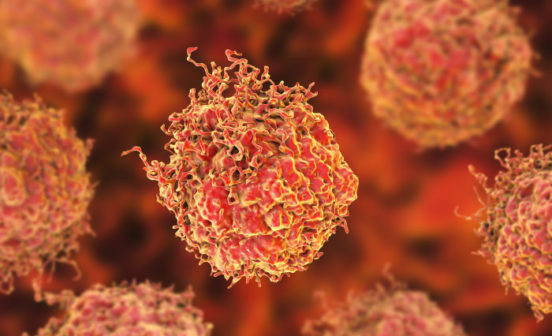Therapeutic A new hope for drug-resistant gestational trophoblastic neoplasia

Gestational trophoblastic neoplasia is a collective term for a number of malignant pregnancy-related disorders, such as choriocarcinoma and placental site trophoblastic tumours that invade locally or metastasise. This disease affects approximately 18,000 women globally every year, and is treated with chemotherapy, using human chorionic gonadotropin (hCG) in serum as a sole response biomarker.
However even with available treatment options, up to 5% of women die from multi-drug resistance, thus necessitating additional approaches for diagnosing and treating this devastating disease. Recent studies demonstrated that several cancer types expressing programmed cell death ligand 1 (PD-L1) can evade anti-cancer activity of the immune system. PD-L1 expression also maintains gestational tolerance and is strongly expressed by gestational trophoblastic neoplasias, suggesting a tumour-protecting role of PD-L1. Imperial College researchers, supported by the NIHR Imperial BRC and based at the Gestational Trophoblastic Disease Centre, hypothesised that inhibiting PD-L1 with a targeted agent pembrolizumab would selectively kill tumour cells, even if they are resistant to chemotherapy.
In a collaborative study between Karolinska University Hospital (Stockholm, Sweden) and Charing Cross hospital (London, UK), four patients with genetically-verified drug-resistant gestational tumours have been treated to date. PD-L1 expression and tumour-infiltrating lymphocytes (TILs) were assessed as biomarkers, alongside hCG measurement. Preliminary findings were recently published in The Lancet, where three patients responded to pembrolizumab, with notable shrinkage of metastatic lesions. Treatment was well tolerated by all four patients, which makes pembrolizumab an appealing alternative to high-dose chemotherapy. Interestingly, these initial results showed that PD-L1 expression alone did not predict response to immunotherapy. Instead, TIL presence and distribution correlated with anti-PD-L1 activity. The study also shines a light on the biological mechanism of immune stimulation by pembrolizumab.
Although only a few patients have been treated to date, this study provides important evidence for use of pembrolizumab in the management if drug-resistant gestational trophoblastic neoplasia, for which there is currently no cure. The Gestational Trophoblastic Disease Centre is based at Charing Cross Hospital, London, and is led by Professor Michael Seckl, who continues this work.





